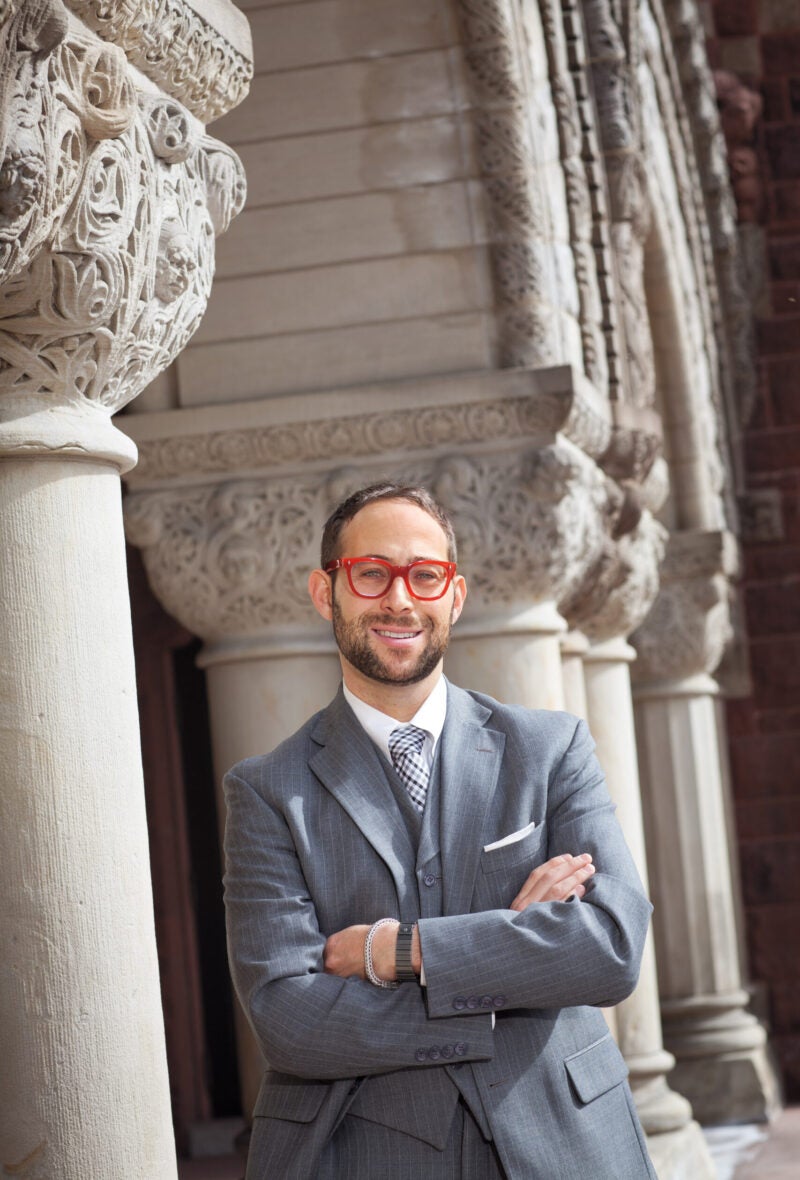I. Glenn Cohen ’03, the James A. Attwood and Leslie Williams Professor of Law and a deputy dean at Harvard Law School, has been elected a member of the prestigious National Academy of Medicine.
Election to the academy is considered one of the highest honors in the fields of health and medicine and recognizes individuals who have made major contributions to the advancement of the medical sciences, health care, and public health.
Cohen, one of the world’s leading experts on the intersection of health care, bioethics and the law, has received international acclaim for organizing major scholarly collaborations.
Cohen focuses his scholarship on bioethics and health law in the U.S. and globally, including pioneering work on AI/big data and health, abortion, reproductive rights and technologies, therapeutic use of psychedelics, and LGBTQ rights. As faculty director of Harvard Law School’s Petrie-Flom Center for Health Law Policy, Biotechnology & Bioethics, he oversees an internationally renowned research center with a founding mission of promoting interdisciplinary analysis and legal scholarship in health law policy, biotechnology, and bioethics.
He was among 100 new members in the United States and 10 internationally who were elected to the academy during NAM’s annual meeting this fall.
“I am incredibly honored to become a member of the NAM, an organization I deeply admire and have worked closely with for years.” Cohen said. “As with any such milestone, it would not be possible without the incredible mentorship I have received in the field both from those within the law school, like Einer Elhauge, and those outside of it, including Bernie Lo, Bill Sage, Judy Daar, Eli Adashi, Mark Hall, the late Dan Brock and many others. “
Cohen is the author, co-author, editor, or co-editor of more than 20 books, including “COVID-19 and the Law” (Cambridge University Press, 2023); “Reproductive Technologies and the Law” (Caroline Academic Press, 2022); “The Future of Medical Device Regulation” (Cambridge University Press, 2022); and “Consumer Genetic Technologies: Ethical and Legal Considerations” (Cambridge University Press, 2021). He is also an author of more than 200 articles and chapters in leading law, science, medical, public health, and bioethics journals.
Cohen has advised the U.S. vice president on reproductive rights, discussed medical AI policy with members of the Korean Congress, and lectured to legal, medical, and industry conferences around the world.
He has served on the Steering Committee for Ethics for the Canadian Institutes of Health Research, the Canadian counterpart to the NIH, and the Ethics Committee for the American College of Obstetricians and Gynecologists and the Ethics Committee of the U.S. Organ Procurement and Transplantation Network.
He is a leading bioethical voice in the media and his work has been frequently covered by, or has appeared in, media outlets including PBS, NPR, ABC, NBC, CBS, CNN, The New York Times, The Washington Post, and The Boston Globe.
The National Academy of Medicine, established originally as the Institute of Medicine in 1970 by the National Academy of Sciences, addresses critical issues in health, science, medicine, and related policy and inspires positive actions across sectors.
New members are elected by current members through a process that recognizes individuals who have made major contributions to the advancement of the medical sciences, health care, and public health. At least one-quarter of the academy’s membership is selected from fields outside the health professions, including in fields such as law, engineering, social sciences, and the humanities.
The newly elected members bring NAM’s total membership to more than 2,400, which includes nearly 200 international members.
In addition to Cohen, Harvard affiliates elected this year include:
Jonathan F. Bean, M.D., M.P.H., professor, department of physical medicine and rehabilitation, Harvard Medical School; and director, New England Geriatric Research Education and Clinical Center, VA Boston Healthcare System;
Bob S. Carter, M.D., Ph.D., William and Elizabeth Sweet Professor of Neurosurgery, Harvard Medical School and Massachusetts General Hospital;
Leemore Dafny, Ph.D., Bruce V. Rauner Professor of Business Administration, Harvard Business School; and professor of public policy, Harvard Kennedy School;
Patricia C. Dykes, Ph.D., M.A., R.N., research program director, Center for Patient Safety, Research, and Practice, Brigham and Women’s Hospital; and professor of medicine, Harvard Medical School;
Marcia Carmen Haigis, Ph.D., professor, department of cell biology, Harvard Medical School;
Nicole Maestas, M.P.P., Ph.D., John D. MacArthur Professor of Health Care Policy, Harvard Medical School;
David Pellman, M.D., Howard Hughes Medical Institute investigator and professor of cell biology and pediatrics, Dana-Farber Cancer Institute and Harvard Medical School;
Olivier Pourquié, Ph.D., Frank Burr Mallory Professor, department of pathology, Brigham and Women’s Hospital, and department of genetics, Harvard Medical School;
Hao Wu, Ph.D., senior investigator, Program in Cellular and Molecular Medicine, Boston Children’s Hospital; and Asa and Patricia Springer Professor, department of biological chemistry and molecular pharmacology, Harvard Medical School
NAM works alongside the National Academy of Sciences and National Academy of Engineering to provide independent, objective analysis and advice to the nation and conduct other activities to solve complex problems and inform public policy decisions.
With their election, NAM members make a commitment to volunteer their service in National Academies activities.
Want to stay up to date with Harvard Law Today? Sign up for our weekly newsletter.
